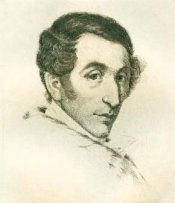
02 Mar 2006
WEBER: Oberon
Oberon, Romantic opera in three acts
Music by Carl Maria von Weber. Libretto by James Robinson Planché after Oberon by Christoph Martin Wieland and the 13th-century French romance Huon de Bordeaux
Mozart and Salieri, an opera in one act consisting of two scenes.
Nicolai Rimsky-Korsakov (1844-1908), composer. Libretto derived from Alexander Puskhin's play of the same name.
First performance: 7 December 1898 in Moscow.
Ariadne auf Naxos, Oper with a prologue and one act. Music composed by Richard Strauss. Libretto by Hugo von Hofmannsthal.
La Vestale, a tragédie lyrique in three acts.
Boris Godunov, an opera in four acts with prologue
Modest Mussorgsky, composer. Libretto by the composer, based on Alexander Pushkin's drama Boris Godunov and Nikolai Karamazin's History of the Russian Empire
First performance: 8 February 1874 at the Mariinsky Theatre, St. Petersburg
Il Trovatore, dramma in four parts.
Only a few months following the premiere of Der Rosenkavalier, Hugo von Hofmannsthal proposed a new opera to Richard Strauss based on Molière’s comedy-ballet, Le Bourgeois gentilhomme (in German, Der Bürger als Edelmann).
Die Entführung aus dem Serail, Singspiel in 3 Acts.
Music composed by Wolfgang Amadeus Mozart (1756–1791). Libretto by Johann Gottlieb Stephanie the Younger, based on an earlier libretto by
Christoph Friedrich Bretzner.
Die Entführung aus dem Serail, Singspiel in 3 Acts.
Music composed by Wolfgang Amadeus Mozart (1756–1791). Libretto by Johann Gottlieb Stephanie the Younger, based on an earlier libretto by
Christoph Friedrich Bretzner.
Arabella: Lyrische Komödie in three acts
Die Entführung aus dem Serail, Singspiel in 3 Acts.
Music composed by Wolfgang Amadeus Mozart (1756–1791). Libretto by Johann Gottlieb Stephanie the Younger, based on an earlier libretto by
Christoph Friedrich Bretzner.
La Gioconda, dramma lirico in four acts.
Music composed by Amilcare Ponchielli (1834–1886). Libretto by Arrigo Boito (under the pseudonym Tobia Gorrio), based upon Victor Hugo's Angelo, Tyrant of Padua (1835).
Don Carlo, an opera in four acts. Music composed by Giuseppe Verdi (1813–1901). Libretto by Joseph Méry and Camille Du Locle after Friedrich von Schiller’s dramatic poem Don Carlos, Infant von Spanien. Revised version in four acts (French text revised by Du Locle, Italian translation by Achille de Lauzières and Angelo Zanardini).
Un ballo in maschera, a melodramma in three acts.
Music composed by Giuseppe Verdi. Libretto by Antonio Somma, based upon the work of Eugène Scribe Gustave III ou Le bal masqué (1833)
Medea: Melodramma tragico in three acts.
Die Tote Stadt, an opera in three acts.
Music composed by Erich Wolfgang Korngold (1897-1957). Libretto by Paul Schott (Julius and E. W. Korngold) after the novel Bruges la morte by Georges Rodenbach.
Some Details concerning the Revolution inaugurated by Rossini
Manon Lescaut, dramma lirico in quattro atti
Elektra: Tragedy in one act.
Lyric Opera of Chicago has announced both schedules and cast-lists for is Spring 2020 performances of Richard Wagner’s Ring Cycle. Given the series of individual productions already staged by the company since Fall 2016, that pave the way for the complete cycle, Lyric Opera of Chicago’s complete production should affirm the artistic might of the great composer.
“Diacono himself does not know what musical talent he possesses” – Mascagni

Oberon, Romantic opera in three acts
Music by Carl Maria von Weber. Libretto by James Robinson Planché after Oberon by Christoph Martin Wieland and the 13th-century French romance Huon de Bordeaux
Streaming Audio
First Performance: 12 April 1826 at Covent Garden, London
Principal Characters:
| Oberon | Tenor |
| Titania | Actor/Dancer |
| Puck | Mezzo Soprano |
| Sir Huon Of Bordeaux | Tenor |
| Sherasmin | Baritone |
| Rezia | Soprano |
| Fatima | Mezzo Soprano |
| Two Mermaids | Mezzo Soprano |
| Droll, Caliph Haroun Al Rachid, Namouna, Babekan, Abdallah, Almanzor, Roshana and Charlemagne | Spoken Roles |
Time and Place: Ninth Century France, Persia and North Africa.
Synopsis:
Oberon and Titania have quarrelled over the matter of male or female inconstancy and will be reconciled when a couple constant through misfortune can be found. The Emperor Charlemagne has ordered Sir Huon of Bordeaux to travel to Baghdad. There he must kill the man on the right hand of the Caliph and kiss and marry the Caliph's daughter. Sir Huon sees the Caliph's daughter, Reiza, in a dream, and is given by Oberon a magic horn to summon necessary aid and a magic goblet, that will burn the lips of the impure. By the Tigris Sir Huon saves the Saracen prince Babekan, betrothed to Reiza, from a lion. Babekan drinks from the goblet, his lips are burned and he attacks and is repelled by Sir Huon. In Haroun al Raschid's palace Reiza wants to avoid marriage to Babekan and has seen her rescuer in a dream. Sir Huon arrives. In the second act, in the Caliph's palace, Reiza is saved from marriage to Babekan, who is killed, while the court is paralysed by the sound of the magic horn. Sir Huon and Sherasmin, with Reiza and Fatima, escape by ship, which is wrecked. Reiza is abducted by pirates and Oberon tells Puck to take Huon, bound and unconscious, to the house of Ibrahim in Tunis, where the third act opens. Now Sir Huon, escaping from imminent execution through the blowing of the magic horn by his squire, rescues Reiza from the harem of the Emir. Their trials now over, the couple is transported to the palace of Charlemagne by Oberon and Titania and the opera ends with praise of the constant Sir Huon and Reiza.
[Synopsis Source: Naxos]
Click here for complete libretto (English).
Click here for complete libretto (German).
Click here for the score of the overture (Scorch plug-in required).
iTunes Users: Right click here and save playlist. Then import into iTunes.